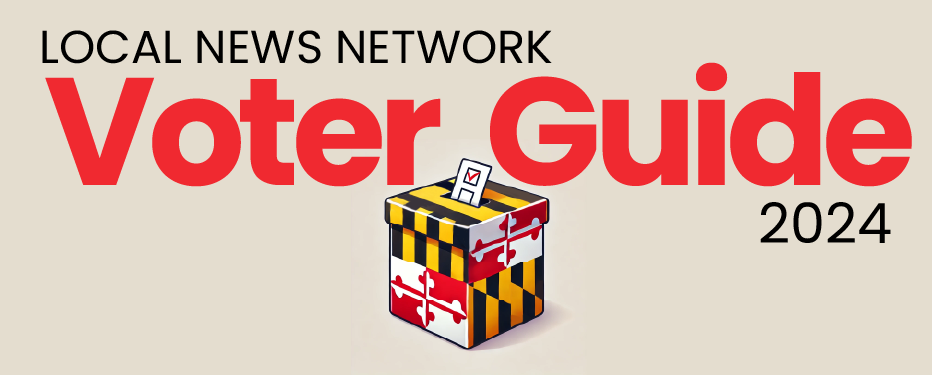Zakyia Goins-McCants
Running for school board in Prince George's County District 8
How old will you be on Election Day (Nov. 5)?
32
Are you currently employed? If so, where, and what is your job title?
Interim director of school data and performance in a neighboring school district.
What is the highest level of education that you completed, and where did you get that degree?
I hold a bachelor's degree from Howard University as well as a master’s degree and post-graduate certificate in education administration and supervision, both from Johns Hopkins University School of Education.
Why are you running for the school board?
I'm running because our children deserve a board member who knows education, will elevate the voices of the community and can hold our administration accountable. I've been a passionate advocate for educational equity since I was a student in Prince George’s County Public Schools. My experiences throughout my own educational career drove me to advocate for educational opportunities and then to pursue a career in education full time. As a teacher working in Prince George’s County Public Schools and a community member helping others to navigate the issues in our school system, I saw a lot that needed to change. I have a unique set of personal and professional experiences that make me a valuable asset to the board, as well as a passion for education and love for my community that allow me to be of service and a part of the solution.
What makes you a good candidate for the board?
As someone who grew up, attended school and taught right here in District 8, I understand our schools’ unique challenges and strengths. I have dedicated my 10+ year career to advancing educational equity and excellence for all children. From undergrad at Howard University to earning a master’s degree at Johns Hopkins School of Education, I have studied education systems and improving outcomes for students, especially those with the most barriers to success. I have been a classroom teacher, trained teachers as a coach and data manager, and successfully advocated for education policy change at the local, state and national levels. My current job involves helping school leaders use data to improve student outcomes. In addition to my professional credentials, I have a true heart for this work and my community. Education is my passion, and I’d like to bring my unique experience and expertise together with the genius of Prince George’s County Public Schools staff and the broader community to make our schools a model for the nation.
What is the most important issue facing your school board and what would you do about it if elected?
The school board is responsible for governance and budget setting, while the superintendent manages day-to-day operations. One of the most pressing issues facing our board is how to equitably provide an excellent education for all children, despite numerous national and local challenges. Our district consistently ranks near the bottom in the state in math and reading, and I’ve heard from both special education parents and educators that urgent action is needed. Additionally, our growing population of multilingual learners remains underserved. If elected, I would prioritize creating policies that support evidence-based interventions, leveraging both community input and the expertise of our staff. Drawing on my own background in education, I would push for targeted investments in areas like literacy and language acquisition programs. I would also advocate for stronger professional development for our teachers, ensuring they have the resources and support needed to help all students succeed. To ensure accountability, I would support the use of data-driven approaches to continuously assess and improve the effectiveness of our interventions, ensuring we make adjustments based on real-time feedback. By maintaining an open dialogue with the community, I would foster a collaborative approach to solving these challenges.
Please name a public leader you admire and explain why.
I admire leaders like Congresswomen Ilhan Omar, Ayanna Pressley and Alexandria Ocasio-Cortez for their courage in standing up for what is right and their transparency. I appreciate how they make complex issues accessible and engage directly with constituents through social media. Their progressive ideals and commitment to inclusive governance inspire me, especially in their advocacy for marginalized communities. These qualities are essential in public leadership, and I hope to bring the same level of transparency and engagement to my role on the school board, ensuring all voices are heard while maintaining a clear focus on equity and justice.
The Blueprint for Maryland’s Future, passed by the General Assembly in 2021, is a 10-year plan that includes increased education funding to support early childhood education, increased teacher starting pay, college/career-readiness standards for high school graduates, and expanded services to multilingual and impoverished families, among other goals. Please tell us your views on the Blueprint and how it will affect your school district.
The Blueprint for Maryland’s Future is transformative legislation that reflects our state's commitment to equitable education. However, it was passed without a full funding plan, and the financial implications are significant. In Prince George's County, key issues include the need to increase teacher salaries, support early childhood education and provide expanded services to multilingual learners and families in poverty. The rising costs of these initiatives, combined with inflation and existing budget constraints, pose a major challenge. As a school board member, I would advocate for additional state funding while exploring innovative solutions such as public-private partnerships or reallocating resources to ensure that the Blueprint's goals are met without compromising student or staff well-being. I am particularly excited about the Blueprint’s focus on early childhood education and career and technical education as well and the acknowledgement that education is more than just preparing students kindergarten-12 to attend college. I also see the opportunity to strengthen our multilingual programs to better serve our growing diverse population. To succeed, we will need to make sure that parents and our overall community understand the Blueprint and how it interacts with national education law such as the Every Student Succeeds Act, IDEA (Individuals with Disabilities Education Act) and Section 504 of the Individuals with Disabilities Act and how we as board members are navigating all of these laws and many others to ensure equity and a quality education for all students.
Some school districts nationwide are placing new limits on the use of cellphones in middle and high schools. What do you think should be the policy on student use of cellphones in your district, and why do you support that policy?
There is substantial research showing how disruptive cellphones can be in the learning environment. In my experience, cyberbullying and student distraction due to cellphone use are common issues. However, I’ve also seen teachers use cellphones effectively to support learning, especially when devices or internet access are limited. Families are understandably concerned about security if phones are collected, and students need access during emergencies or while traveling to and from school. I support a comprehensive policy that reflects the views of students, staff and families while acknowledging the realities of our schools. A gradual approach, with clear guidelines tailored to elementary versus secondary students, will help ensure teachers and school leaders aren’t placed in difficult positions enforcing impractical rules. This policy should come with improved resources, such as better WiFi, safe cellphone storage and reasonable consequences for misuse that align with our vision for safe learning environments.
Are you satisfied with your school district's efforts to ensure the safety of its students? What, if anything, should be done to improve school safety in your district?
No, I’m not satisfied, but I appreciate the progress being made. Physical, psychological and intellectual safety for both staff and students must be prioritized. Ways we can improve safety include:
1. Implementing restorative practices in every building to address conflicts as they arise and restore harmony afterward, teaching students conflict management.
2. Re-evaluating the student rights and responsibilities handbook with input from all stakeholders to ensure it promotes positive learning environments for all students and reflects our values on how to achieve that.
3. Ensuring that every student-facing staff member, including aides, substitutes and security, is trained in at least one recognized approach for responding to student needs, such as Crisis Response Institute, Response Abilities Pathways or mental health first aid. Additionally, physical security measures must be equitably provided across the district. By combining these measures with stronger physical safety and communication protocols, we can create a safer, more supportive learning environment for everyone.
Do you think there are circumstances when books should be removed from school libraries? If so, what kind of books should be removed, and who should make those decisions?
Books that are not developmentally appropriate for the age of students in a building should not be in school libraries, and I believe our library professionals do an excellent job managing this. Reading is fundamental and opens up the world to our students. They deserve to see themselves reflected in literature and to access information that is appropriate for their development.
I support Prince George’s County Public Schools’ policy allowing families to restrict access to certain books for their own child without removing them from the library. This approach strikes a balance between student access and parental concerns, while relying on professionals to do their job. There is already a process for reviewing curriculum materials, and a similar process for library books could be helpful to allow community input and ensure transparent decisions.
Some school districts enact policies allowing transgender and gender nonconforming students to use their preferred pronouns while at the same time not informing those students' parents about that decision. What is your opinion of such policies?
I respect parents' right and responsibility to guide their children, and I also believe schools are responsible for providing safe and positive learning environments. Calling someone by their preferred name or pronouns is a basic way to do that. While it’s important for parents to be informed of their child’s actions and decisions at school, the outing of LGBTQ students to parents is a complex legal and safety issue with serious, sometimes fatal, consequences. I believe policies should vary based on the age of the student, as the developmental impact on elementary children differs from that of high school seniors. If Prince George’s County Public Schools were to create an official policy on this matter, it should involve full stakeholder engagement and the guidance of an advisor knowledgeable in both the legalities, ethics and psychological impact of the situation.


